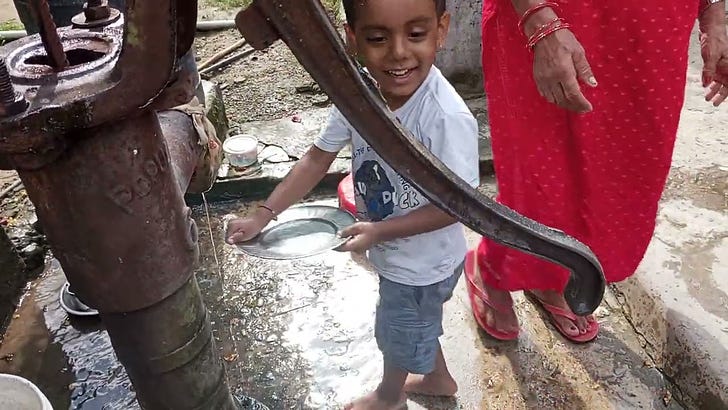(From 2 years ago)
This was my best Dashain (Nepal’s biggest annual festival). The reason: I became a child again, thanks to my two-year-old son.
This was our first celebrated Dashain with him. Conceived and born during the horrible days of pandemic, he is now probably in the most joyous stretch of his entire life. He won’t be able to reminisce and enjoy the memory of these moments though.
ha-ju-ba or Grandpa! This is probably the first three-syllable word he has spoken. He spoke the word yesterday after mastering half a dozen two-syllable words. He says it, smiles and often bursts into laughter if we join him. Even though his verbal faculty is yet to catch up, he can already sense a range of emotions in the room and tries to behave accordingly.
This tender experience with the child has reminded me of my own childhood days in the village. Of the four surviving siblings out of five, I was born third. My younger brother was conceived when I was eight months old. When I was two, he was already seven months old. The older siblings were themselves little more than toddlers.
That may be why none of us can imagine our childhoods as individuals. For us, everything happened together. We were loved by the parents as ‘children’, fed and educated as ketaketi or boys-girls. That collectiveness was even more pervasive when it came to celebration of feasts and festivals: we celebrated Dashain back then, not I.
As you might have guessed already, in such a big (even if nuclear) family, we were short of everything all the time.
The entire village subsisted on agriculture. People would be short of grains between harvesting seasons, so grains used to be borrowed liberally. Many families would go without any protein in diet for months on end. Meat was the privilege for only Dashain festival for many in the village. Most of us school-children would get one—or two at most—pairs of school dress during Dashain festival and that was all for new clothes throughout the year.
That said, though, ours was a privileged caste family and relatively better off among the villagers. Two times every year, our dad would go to fetch pension from the Indian government for his eighteen years-long service to their army. He used to come back with new clothes for us and that cemented our status as better-off kids in the village.
Because of the short tenure in the army, though, his pension was meager compared to that of his compatriots and demands from raising four kids far outstripped the supply of resources from all the means at his disposal.
Over time, we siblings went to schools, graduated, left for colleges and eventually settled in the city. Our parents too migrated one day to stay close to us. Our family still counts as the success story in our ancestral village and our schools.
In their own lives, our parents pulled all of us away from poverty and scarcity and ensured upward mobility for us by making sure that we were educated to the best of circumstances.
I am now a doctor. Elder brother works for a prestigious INGO. Younger brother is an entrepreneur. Our only sister is a community leader.
As we grew up into responsible adults, however, it seems we lost something along the way.
We became beset by all the anxieties related to livelihood and what not. Festivals became rituals. Familial bonds frayed without us even noticing the process. We no longer eagerly anticipated the Dashain celebrations for months. Shopping for new clothes became nuisance instead of the uncontaminated joy it used to be.
Besides, life in the city, with all its rush and cacophony, was no longer the same as life in the village.
Here, neighbors barely tolerated you. Relatives compulsorily brought pesticide-laden fruits but little warmth and affection with them. You could buy a whole box of biscuits but eating them brought no festive satisfaction. You could even ride a car like the one in schoolbooks but that brought you no ecstasy as you once imagined it would.
You even flew, yes really FLEW, in the aeroplane but that didn’t set you free, instead bonded you even more strongly with the problem-infested land.
Mediocrity. Banality. Rituals. Duties. Unfulfilled dreams. Incomplete projects. Broken promises. Reneged moral values. And a fog of senselessness. As years passed, these virtues largely dominated our lives.
Then my son was born. A clean life slate to start with. Full of potential. Pure. Uncontaminated. Innocent.
Ever since his entry into our lives, I have enjoyed the life vicariously alongside him. And learned that it should take no more than sight of your parents for the highest form of joy. Sorrow in life, which starts with separation anxiety barely few months after birth, is such an integral part of your life that you should take it in your strides.
He smiles and the world smiles. He cries but the world doesn’t cry but seeks solutions to problems like how to placate a crying child. He speaks ha-ju-ba and the whole household is thrilled together, forgetting everything that has become boring or mediocre over the years.
May he grow and attain in life everything a person can aspire for but not lose some of that carefree spontaneity!




Childhood innocence and ecstasy over little things have just been a beautiful memory to cherish!
Woh kaagaj ki kasti, woh barish ka pani...